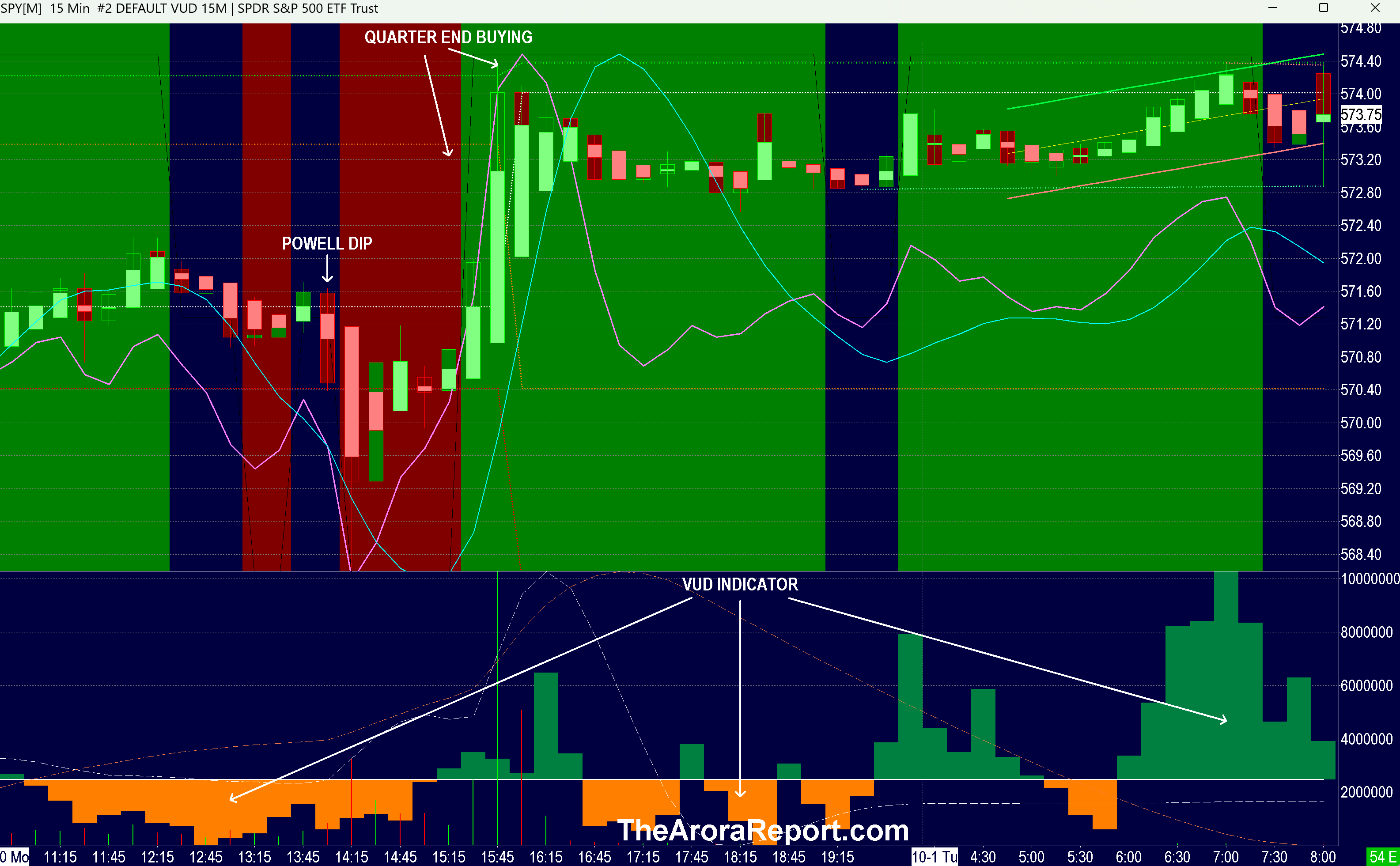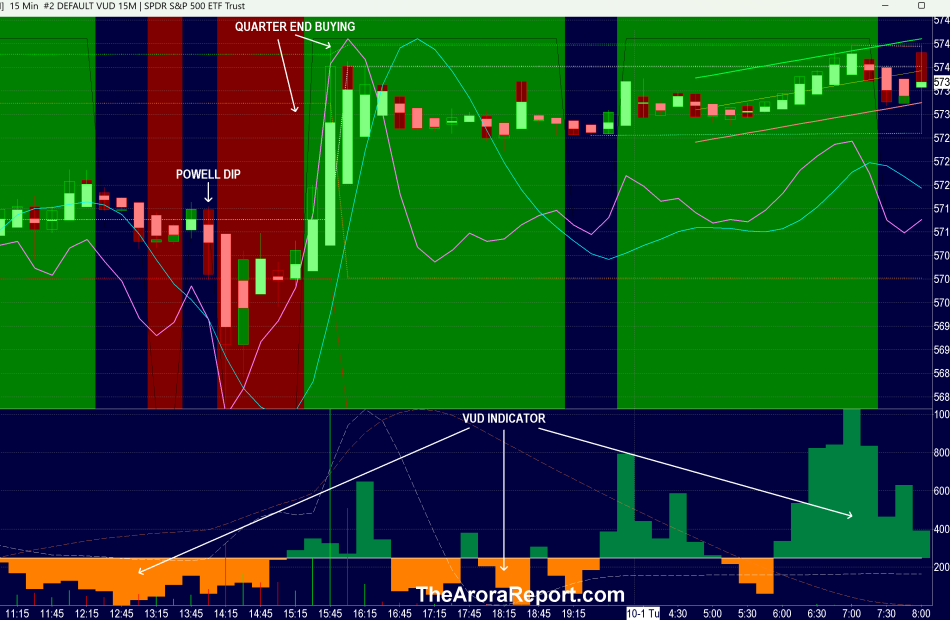Powell Stock Market Drip Aggressively Bought, Important Data And Blind Money Ahead
To gain an edge, this is what you need to know today.

Important Data Ahead
Please click here for an enalrged chart of SPDR S&P 500 ETF Trust SPY which represents the benchmark stock market index S&P 500 (SPX).
Note the following:
- The chart shows the dip in the market caused by Powell’s remarks. Powell pushed back against aggressive rate cut bets that the momo crowd has placed. Powell clearly said that the Fed plans on two 25 bps cuts this year assuming the economy stays on the expected trajectory. The momo crowd is counting on 100 bps cut. Even non-momo investors are betting on 75 bps cuts.
- The chart shows the dip on Powell’s remarks was aggressively bought, running the stock market higher than where it was before Powell’s remarks. The buying appears to be related to quarter end window dressing.
- Momo gurus’ new narrative to persuade their followers to buy stocks is to not trust the Fed. Prudent investors always need to be mindful that momo gurus’ interest is not the same as prudent investors’ best interest.
- There are two important pieces of data ahead.
- JOLTS job openings data will be released at 10am ET.
- ISM Manufacturing index will also be released at 10am ET.
- Both of these pieces of data may be market moving.
- The most important economic data this week is the jobs report, also known as the mother of all reports, that will be released at 8:30am ET on Friday.
- Expect blind money to flow into the stock market today and tomorrow. Blind money is the money that flows into the stock market on the first two days of the month without any analysis irrespective of market conditions.
- East coast port workers have gone on strike. FedEx Corp FDX is a beneficiary. As full disclosure, FDX was recently added to the portfolio that surrounds the Core Model Portfolio in The Arora Report’s ZYX Buy, taking advantage of the dip on earnings. The Arora Report utilizes over 50 different strategies. FDX belongs to the strategy of earnings patterns that historically work.
- In important news for prudent investors, Michael Dell has sold $1.22B in Dell Technologies Inc DELL shares. Michael Dell is taking advantage of the run up in Dell shares on the AI frenzy. The momo crowd is oblivious and has been an aggressive buyer of DELL stock.
- Prudent investors should also note that there is a consistent pattern of insiders selling AI stocks that have run up. It is important to pay attention to the protection band as well as to separate articles indicating putting on hedges or taking partial profits.
Japan
Japan’s new prime minister is likely to favor tighter fiscal policy and tighter monetary policy. Such tighter policies will be good for the Japanese yen. As full disclosure, there is a position in yen using Invesco CurrencyShares Japanese Yen Trust FXY in The Arora Report’s ZYX Allocation. On the negative side, tighter fiscal and monetary policies in Japan increase the risk to the carry trade. Lately, in the carry trade, funds have been borrowing in yen and investing in U.S. stocks, especially AI stocks.
Magnificent Seven Money Flows
In the early trade, money flows are positive in Alphabet Inc Class C GOOG, Meta Platforms Inc META, NVIDIA Corp NVDA, and Tesla Inc TSLA.
In the early trade, money flows are negative in Apple Inc AAPL, Amazon.com, Inc. AMZN, and Microsoft Corp MSFT.
In the early trade, money flows are mixed in (SPY) and Invesco QQQ Trust Series 1 QQQ.
Momo Crowd And Smart Money In Stocks
Investors can gain an edge by knowing money flows in SPY and QQQ. Investors can get a bigger edge by knowing when smart money is buying stocks, gold, and oil. The most popular ETF for gold is SPDR Gold Trust GLD. The most popular ETF for silver is iShares Silver Trust SLV. The most popular ETF for oil is United States Oil ETF USO.
Bitcoin
Bitcoin BTC/USD is range bound.
Protection Band And What To Do Now
It is important for investors to look ahead and not in the rearview mirror.
Consider continuing to hold good, very long term, existing positions. Based on individual risk preference, consider a protection band consisting of cash or Treasury bills or short-term tactical trades as well as short to medium term hedges and short term hedges. This is a good way to protect yourself and participate in the upside at the same time.
You can determine your protection bands by adding cash to hedges. The high band of the protection is appropriate for those who are older or conservative. The low band of the protection is appropriate for those who are younger or aggressive. If you do not hedge, the total cash level should be more than stated above but significantly less than cash plus hedges.
A protection band of 0% would be very bullish and would indicate full investment with 0% in cash. A protection band of 100% would be very bearish and would indicate a need for aggressive protection with cash and hedges or aggressive short selling.
It is worth reminding that you cannot take advantage of new upcoming opportunities if you are not holding enough cash. When adjusting hedge levels, consider adjusting partial stop quantities for stock positions (non ETF); consider using wider stops on remaining quantities and also allowing more room for high beta stocks. High beta stocks are the ones that move more than the market.
Traditional 60/40 Portfolio
Probability based risk reward adjusted for inflation does not favor long duration strategic bond allocation at this time.
Those who want to stick to traditional 60% allocation to stocks and 40% to bonds may consider focusing on only high quality bonds and bonds of five year duration or less. Those willing to bring sophistication to their investing may consider using bond ETFs as tactical positions and not strategic positions at this time.
The Arora Report is known for its accurate calls. The Arora Report correctly called the big artificial intelligence rally before anyone else, the new bull market of 2023, the bear market of 2022, new stock market highs right after the virus low in 2020, the virus drop in 2020, the DJIA rally to 30,000 when it was trading at 16,000, the start of a mega bull market in 2009, and the financial crash of 2008. Please click here to sign up for a free forever Generate Wealth Newsletter.
Market News and Data brought to you by Benzinga APIs
© 2024 Benzinga.com. Benzinga does not provide investment advice. All rights reserved.


Leave a Reply